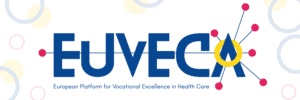An article by Silvia Prieto, Gertrudes Fornés, Olga Navarro, Vicente Traver
The ITACA Research Institute of Valencia Polytechnic University (UPV) and the Polibienestar Research Institute of the University of Valencia (UV) have developed a regional Hub in the framework of the EUVECA project. This Hub serves as a platform where stakeholders from the social and health sector meet regularly to discuss and share different training initiatives that each of them is developing. Linked to other European Hubs developed within the framework of the same project, its purpose is to facilitate communication and foster collaborative opportunities among partners.
The third meeting of the Valencia Regional Hub took place on 14 February 2024. This is a European Network for professionals in the social and health care sector where the different institutions share their success stories. The meeting was opened by Patricia Fernández and Jorge Navarro, from the Incliva Research Institute.
In the beginning, Juan José Tirado, President of CECOVA shared the activities that are currently underway to promote training for healthcare professionals. Ángela Tormo, psychologist and training coordinator of Lares CV, shared the transformation of the care model according to person-centred care principles. José Manuel Martínez, CEO of MEDICARAMA, presented the training platform for the healthcare sector that he has been leading for the past 10 years. Paula Castells, director of nursing at Vithas, shared her ongoing activities, including training pills for new employees, nurse chatBot, health classroom, and more. Gerardo Aguilar (Medicine. Hospital Clínic and University of Valencia) and Carmen Casal (Nursing. Nursing College and University of Valencia) presented the Centre for Interdisciplinary Simulation in Health (CESIS) of the University of Valencia. This centre brings together six faculties: medicine and dentistry, nursing and podiatry, pharmacy, physiotherapy, and psychology. They presented the case of the ‘polytrauma patient’.
The success stories continued with the Vicepresidencia Segunda y Conselleria de Servicios Sociales, Igualdad y Vivienda de Generalitat Valenciana, represented by Rafael Bayo and Chus Soriano, who introduced the new Dirección General del Sistema sociosanitario y del Instituto Valenciano de formación, investigación y calidad. They presented the case of the Single Social History, consisting of individual care plans unifying social and health services. They showcased the training programmes designed for 2024 that include training for employees of the GVA and professionals in the system. Furthermore, they demonstrated the IVAP training in the field of dependency and elderly people and training through agreements with the Valencian Federation of municipalities and provinces, professional associations, trade union organisations and the third sector. Elena García, representative of the Asociación de Enfermería Comunitaria (AEC) and teacher at the Escuela de la Fe, explained the training offer and the motivation to enrich the synergies with the entities that meet at the Regional Hub of EUVECA. Finally, Maria Pilar Valero, vice-president of SoVaMFiC, shared the training offer in Family Medicine that is in line with the six megatrends in health at the basis of the EUVECA project, especially ageing, chronic diseases, digitalisation and the climate challenge.
Finally, Doriam Camacho Rodriguez gave a keynote. Doriam Camacho is a Nurse, Doctor in Nursing, with a Master’s degree in Quality, Safety and Environmental Management and a Specialist in Quality Management and Health Auditing. She is an Associate Researcher at MINCIENCIAS, with experience in bioethics, environmental research, and environmental health promotion. She is Dean of the Faculty of Nursing at the Universidad Cooperativa de Colombia Campus Santa Marta and a member of ANHE. Prof Camacho discussed the impact of climate change and its effects on health. Prof Camacho underlined the ethical obligation of nurses and the health sector to environmental sustainability, endorsing the importance of the climate change megatrend that was identified by the EUVECA project. It is important to promote a comprehensive response aligned with the Sustainable Development Goals.
All the participants in the meeting agreed on the importance of these Hubs in the field of social and health care. They serve as vital platforms for addressing the pressing need to incorporate 21st century skills into university curricula, alongside the skills needed to address the six mega trends: the ageing population, chronic diseases, the digital transformation, the modern health consumer, personalised medicine, and climate change.


